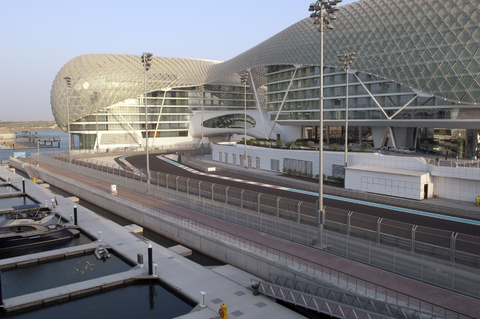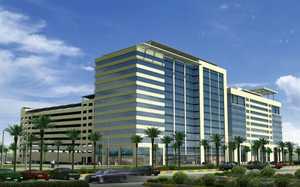
[Updated Oct 2020] A guide to serviced offices and office space to rent in Abu Dhabi as well as general information that may be useful if you are thinking of renting office space in the UAE capital.
For further offices information or to search office space for rent in Abu Dhabi just click. Or contact us for any other query.
History & Geography
The city of Abu Dhabi lies on an island off the central western coast of the Persian Gulf in the Arabian Peninsula. Located approximately 250 meters from the mainland, the island is shaped like a T and is connected by bridges to two other outlying islands. Today Abu Dhabi is one of the largest and richest cities in the Middle East, however, started life as a small coastal settlement in the 16th century. The area was settled by the Bani Yas Bedouin tribe, from which a subsection, the Al Nahyan family, emerged as predominant. The emirate is still ruled by the Al Nahyan clan today. The main bulwark of Abu Dhabi’s economy in the early days of its existence was the pearl trade. At that time the Persian Gulf was the centre of the trade and Abu Dhabi thrived from the industry of its pearl divers. During the 19th century, Abu Dhabi and the surrounding Emirates entered into treaties of trade and protection with Great Britain, the predominant power in the region at the time. Great Britain’s main intention was to counter the pirates in the region as well as engage in trade with Abu Dhabi and the surrounding area. However, as the pearl trade declined in the early 20th century the potential of the oil industry in the area was recognized. In the late 1950s and 60s, massive oil exploration was conducted by mostly French and British companies, leading to the discovery of vast oil shelves off the coast of Abu Dhabi and the other emirates. In the 1970s Abu Dhabi, along with Dubai and several other emirates formed the United Arab Emirates (UAE). Today the UAE is the predominant power in the Persian Gulf and has a thriving economy based on oil, tourism and trade.
Economy
In terms of Gross Domestic Product and per capita income Abu Dhabi is the wealthiest emirate in the UAE and over USD one trillion has been invested in the city from all over the world. Per capita income in the emirate routinely grows by over 10 percent every year. Abu Dhabi also owns 95 percent of the oil reserves in the UAE and six percent of the gas. This means that the emirate owns a full nine percent of the world’s oil reserves and approximately five percent of the natural gas reserves. This oil is the main bulwark of Abu Dhabi’s economy, however, of late the city’s rulers have been attempting to diversify the economy. There has been a substantial investment of late in industry, retail, tourism and real estate. Abu Dhabi has created a number of free zones, including Industrial City of Abu Dhabi (ICAD), twofour54 Abu Dhabi media free zone and the construction of another ICAD is in the works. The rulers of Abu Dhabi are also heavily promoting the tourism industry in the emirate. Of late massive investment has been made in the city’s airport, which in recent years has experienced a growth in passenger volume of over 30 percent.

Culture & Tourism
Abu Dhabi is increasingly becoming one of the Middle East’s most popular tourist destinations. In this regard it is still outstripped by its contemporary, Dubai, however, is rapidly gaining ground. The city’s year-round sunshine and a plethora of beaches are among its primary attractions. Abu Dhabi has 400 kilometres of coastline, of which a full ten kilometres are public beaches. The most popular of these is Al Bateen beach, on which water sports such as wakeboarding and kite surfing are popular. Also popular among tourists are so-called desert safaris, exploring the miles of sand dunes surrounding the city. Of late sand surfing has become increasingly popular. Permanent desert camps set up offer accommodation as well as falconry displays, barbecues, henna painting and more. The city also itself also has a number of significant landmarks, the most imposing of these being the Sheikh Zayed Mosque which has a capacity of over 40,000 and features 82 domes of varying sizes. The mosque cost USD 500 million to construct and its highest minaret is over 350 feet high. Among the most popular annual events in the city, the Red Bull Air Race World Series is the most prominent and regularly attracts tens of thousands of visitors.
Transportation
The main aviation hub for Abu Dhabi is Abu Dhabi International Airport which is the second busiest airport in the UAE. It serves over nine million passengers every year with Etihad Airways being the main carrier. Recently a new terminal has been opened which will serve over 12 million passengers by 2012. The aim is to make the airport a major regional hub eventually serving over 50 million passengers a year and rivalling Dubai International Airport. Transportation in the city itself consists of an extensive bus system, taxis and ferries. Currently, a major expansion of the public transportation infrastructure is being planned which will see hundreds of miles of tramways and rapid transit bus routes traversing the city.
 Office space to rent in Abu Dhabi
Office space to rent in Abu Dhabi
Abu Dhabi’s economy has grown steadily in the last few years and the region’s recent unrest has highlighted the city’s stability. In the last year, prime rents have fallen by two percent to AED 2,250 per square metre per year. The rents are likely to fall even farther in the next few years as new supply hits the market. Consequently, landlords are offering major incentives and it is very much a renters market. Among the disadvantages of Abu Dhabi’s CBD are heavy congestion, lack of parking and insufficient infrastructure.
Our office space search, advisory and acquisition services are FREE, always. Our Abu Dhabi office brokers and agents are globally regulated by the Royal Institution of Chartered Surveyors (RICS) ensuring the highest standards of commercial property advice and service at all times.
